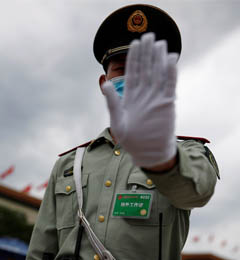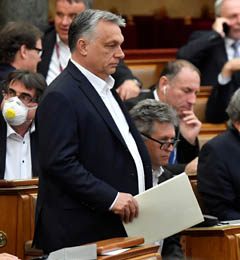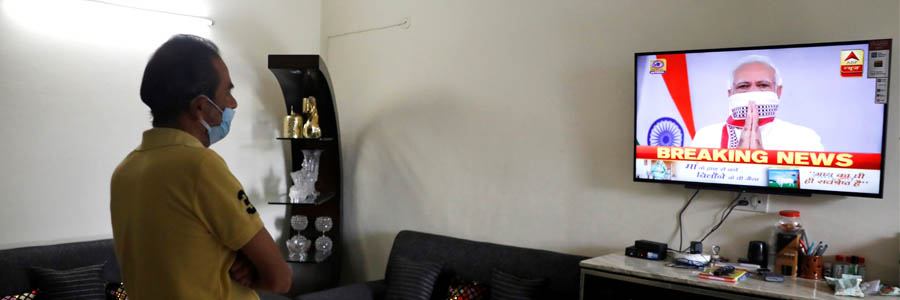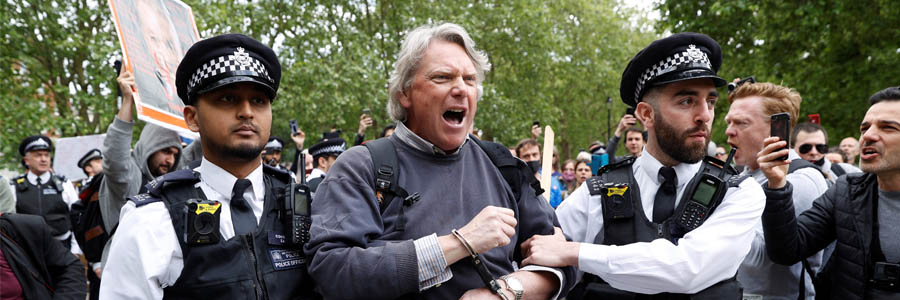Rule of law in the time of Covid-19 - Global Insight June/July 2020
Wednesday 10 June 2020
States across the world have taken drastic action in response to the Covid-19 pandemic. However, there is clear potential for abuse of the situation and a detrimental impact on the rule of law, as has already been seen in various countries. Speaking at the end of March, leading human rights lawyer and Director of the IBA’s Human Rights Institute, Baroness Helena Kennedy QC, and IBA Director of Content, James Lewis, discussed the balance between the fundamental priorities of security and freedom and assessed developments in countries including Hungary, India, Russia, the UK and the US.
James Lewis: The situation with Covid-19 for me brings to mind extreme threats such as terrorist attacks like 9/11, when that balance between fundamental priorities of security and freedom was very much front and centre. Do you feel we’re in a comparable situation or are we in unique unprecedented terrain with the pandemic?
Baroness Helena Kennedy QC: I think that we’re in a unique position. There are similarities, of course, in that there are occasions in our societies and in democracies when you really do have to think hard about the ways in which you encroach upon individual freedom, which we cherish. And you have to say the interests of the public at large has to outweigh individual freedom.
There were elements of that with regard to a percentage of the population back in the period when the Patriot Act [was introduced] in the United States [after 9/11], and where special anti-terrorist legislation was introduced in many countries, including in the United Kingdom. So it’s not an unusual thing to happen when there are those new challenges and where there are some individuals who are being investigated and surveilled for the general protection of society, that there has to be a shift in what one would expect in terms of policing.
The difference now is that this is actually affecting everybody. It is encroaching upon our freedom of assembly and our freedom to move and having a huge impact on the way we live our lives. But it’s seen as being important to the safety of our nations and to prevent deaths. And so people, I think, are making that clear choice, which is that they are permitting, without much rancour, their states to take steps which are seen as being for the protection of all.
While we’re recognising that individual freedoms sometimes have to be constrained for the collective interest, there are ways in which states can really abuse this moment in time. We’re seeing it happening around the world. The main concern that people have at the moment is that special powers may be taken by the state, but they have to be limited in time. And there have to be clear ways of reviewing the exercise of those powers.
JL: The first cases were in China in December 2019, as far as we know, but the scale of the threat only became apparent in March, by which time, of course, it was a pandemic. This was in no small part because of the suppression and silencing of whistleblower doctors. What do you feel this says about freedom of expression, or lack of it specifically in China, and the devastating consequences when freedom of expression is suppressed?
BHK: In an emergency like this, people need to have good information, they need to be told by trusted sources that there are steps they can take to avoid becoming ill and the ways in which they should be conducting themselves. They should be told what powers the state is taking and what the consequences are. There should be real clarity about the position.
One of the things that happened at the very start of this whole pandemic is that China closed down opportunities for people to know what was going on. It’s very tempting for states to do this – they don’t want there to be criticism, they don’t want people to panic, they say. Certainly in China, freedom of expression is not a freedom that is celebrated. And the government often is repressive about journalism and about those who are informing on abuses of power. There certainly was a silencing of those who were trying to let the public know what was going on at an early stage. Many places have taken this moment to actually seek to close down public information from reliable sources.
At the very start of this whole pandemic, China closed down opportunities for people to know what was going on
JL: Do you feel that the devastating effect of China suppressing that information has highlighted the importance of freedom of expression more generally?
BHK: One project that we’ve put a lot of emphasis on within the International Bar Association’s Human Rights Institute (IBAHRI) has addressed media freedom [led by the High Level Panel of Legal Experts on Media Freedom]. The IBAHRI is the Secretariat and 35 countries around the world have signed up to be engaged with this. It’s looking at the ways in which journalism has been under attack in recent times and reviewing the legislation used to silence journalists. It also looks at the positive steps that governments around the world can take in order to give greater protections to media freedom. If you don’t have a free media, then you don’t have access to information about abuses of power, about the ways in which you have rights and how you can exercise them. You really do need good information to be an active citizen. We see this as fundamental to all human rights and to all good law.
JL: In Hungary, Viktor Orbán has been attacking the human rights of marginalised groups. In March, the parliament passed legislation to give him even greater powers to rule by decree. How concerned should we be about that? [At time of going to press, the Hungarian government has indicated that these powers would be relaxed in June.]

A paramilitary police officer outside the Great Hall of the People in Beijing, China, 25 May 2020. REUTERS/Thomas Peter
BHK: Hungary was a country that we saw as being committed to the rule of law. Unfortunately, that has ebbed away. There have been serious attacks on the judiciary and an undermining of its independence and the independence of lawyers. We’re seeing the rule of law being seized in the interests of an authoritarian prime minister taking these powers to himself without limit and without opportunity to monitor.
He created a law which looks as though it’s to prevent fake news, and the truth is, it could be used against straightforward journalism that is calling into question some of the things that government is doing.
JL:There’s another one which is particularly draconian: people deemed to be interfering with a quarantine order could face eight years in prison. This is totally disproportionate, isn’t it?
BHK: Those sorts of sentences and the threat of them have a chilling effect on societies. It sends a message to the rest of Europe, and other places in Europe are following in his footsteps.
Hungary was a country that we saw as being committed to the rule of law. Unfortunately, that has ebbed away
Although it may not have been with malintent, a number of countries have derogated from the European Convention on Human Rights (ECHR). Armenia, Estonia, Georgia, Latvia, Moldova and Romania have all stepped outside of the remit of the ECHR, saying that they need to do that in order to introduce laws to prevent people socialising, to prevent there being public gatherings, etc. The concern one would have is, how long is that derogation taking you outside of the purview of human rights?

Hungarian Prime Minister Viktor Orbán at the plenary session of the Parliament ahead of a vote to grant the government special powers, Budapest, Hungary, 30 March 2020. REUTERS/MTI Zoltan Mathe/Pool
JL: Vladimir Putin has been in power in Russia since 1999. That’s longer than any of the country’s leaders since Joseph Stalin. He’s seeking constitutional amendments that could allow him to stay in power until 2036. I suspect you may have broader concerns with regard to Putin and his use and abuse of power.
BHK: I’m very concerned about his interference in the Constitution. We know the corruption of the state in Russia and its abuse of human rights on many fronts – I think that this should be another alarm call to us.
JL: The citizenship law in India discriminates against Muslims – it is particularly problematic for those fleeing persecution, of course, as it denies them citizenship. It’s really no surprise that we saw Narendra Modi take severe action regarding 1.3 billion people who were ordered to remain at home for weeks (later extended) and they were given just four hours’ notice. Do you feel that’s extreme? Or is it that desperate times call for desperate measures?
BHK: I think that we would say that challenging times call for steps that we wouldn’t consider in ordinary times. However, what is happening in India should shock the world. India is the largest democracy in the world and has a huge poverty-stricken part of its population, who are going to suffer enormously in this.
And while Modi has said he’s going to put money in to help to feed the poor, it’s quite clear that many of the migrant labourers who have come into the cities to work have been turned out of factories, turned out of poor and crowded accommodation and have been put on the roads to return on foot to the places from which they came, with no food. Often it’s women carrying their children.

A man watches India’s Prime Minister Narendra Modi’s address to the nation announcing the extension of a nationwide lockdown, 14 April 2020. REUTERS/Anushree Fadnavis
We know that those poor people are not getting information. Most of their information comes to them via cheap pay-as-you-go phones and that allows them to know what’s going on. Unfortunately, they no longer have money to pay for phones. Modi has also been only too ready to turn off the internet, which should be a source of great concern to us.
There really is terrible punishment taking place, beatings of people found by the police and army to be in the street. We really are not seeing a country which is in any way concerned about the human rights of its poorest.
We should be very concerned and highly critical of Modi, and yet we call him our great friend
Let me just mention the business of Muslims. The new laws that were brought in which were discriminatory against the Muslim population give an indication of a nationalist populist government which is basically also sectarian in that it protects one religion against another. We should be very concerned and highly critical of Modi, and yet we call him our great friend.
JL: As someone who sits in the House of Lords, you had sight of the UK [emergency] legislation as it was going through. At a point, there were concerns that it was going to be in place for two years. It was brought back to six months and to be reviewed.
The legislation does bring in what is, I think it’s fair to say, unprecedented powers in peacetime: restriction of movement, powers to shut down events, wide-ranging police powers. The police have talked about legislation made very, very swiftly. So there’s an adjustment happening. Are you comfortable with the UK legislation?
BHK: We managed to get a commitment from government that there would be monthly monitoring of the exercise of the powers and what was happening, and that there would be a body created to do that. With the speed of the legislation, it was only in the House of Lords for two sitting days. And so in many ways we couldn’t push anything too hard. Once the government promised that they would do this, we accepted it in good faith. So let’s just hope that that is going to happen.
JL: It seems to me that when you’re looking at legislation and measures that have been undertaken in Hungary, India and Russia, and you compare it with the UK, the UK is responding to an extreme situation with extreme measures, but doing it in a way that makes it look quite favourable in comparison.
BHK: At the moment, certainly, that’s how it seems. We have to follow it carefully and make sure that there aren’t abuses of the special powers.
We have to also make sure that these powers are not used [disproportionately] towards certain communities or certain kinds of people.
Isn’t this a moment for us to really [look at] how we deal with those who are inside our prisons?
JL: Are there any specific issues you find particularly concerning right now with regard to America and the Trump presidency?
BHK: There have been real problems for people on the borders. Trump has [waged] a war against anybody coming in from South America, from Central America, into the US, which has [harmed] genuine asylum seekers who are fleeing persecution. He has made it clear that nobody is going to be allowed to even make an asylum application. That is a contravention of international law. It has gone without enough note that he has actually flown in the face of something [in place] since the Second World War and the horrors of what happened to Jewish people at that time and to others.

An anti-lockdown protester is detained by police officers during a demonstration in Hyde Park, London, 16 May 2020. REUTERS/John Sible
There’s a big push in the US, as in many parts of the world, to release people from prisons. Prisons are the places which are absolutely going to be hotbeds for the passing of the virus. And of course, the [easy] way to deal with it is you just lock people up in cells on their own. And if anything, that is going to cause damage to people, not just their physical health, but mental health. Isn’t there a better way of dealing with this? In the UK and elsewhere we should be releasing more and more people from prison. Eighty per cent of women in prison are there for non-violent offences. Isn’t this a moment for us to really [look at] how we deal with those who are inside our prisons? We’re actually seeing this happening in lots of places that surprise us at this moment in time in different parts of the world. So I really would like to see that happening here in the UK, too.
This is an abridged version of an interview available as a podcast at ibanet.org